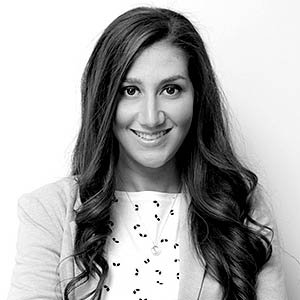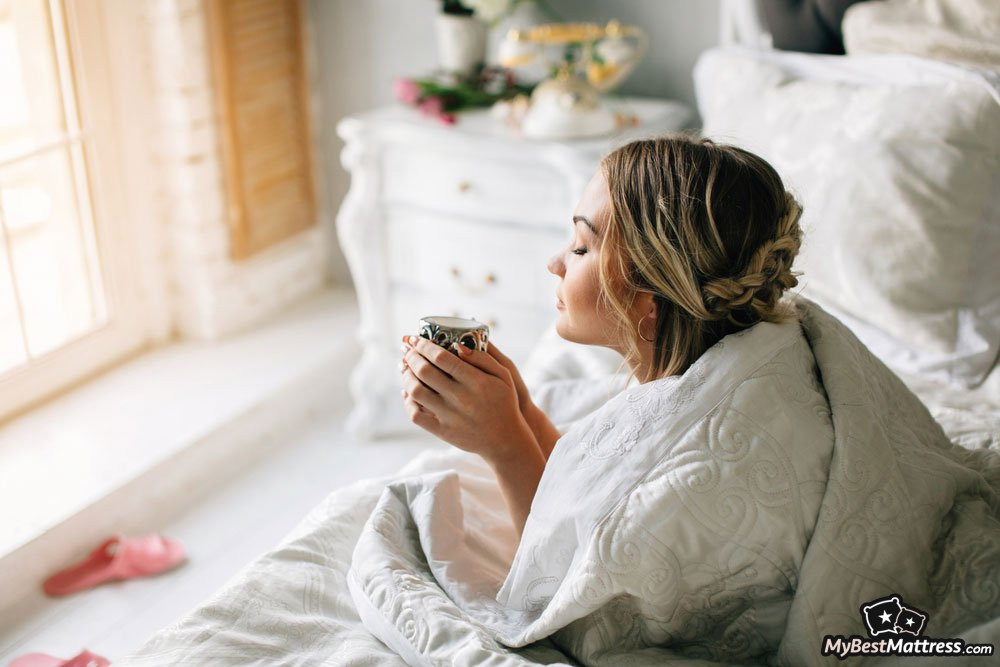
Many people are afraid or simply dislike changes. Unless they're becoming sick (both literally and figuratively) of their habits and have no other option but to bring about those changes. Especially with our sleep - there are a few ways how to fix sleep schedule without being very drastic about it.
There’s no need to change your lifestyle in one day. Just start first by acknowledging that you really want to make some changes in your life. And usually, in some mysterious way, desire inspires the beginning of that.
Sleep makes up more than a third of our life, therefore it must prepare us well for the time we spend awake. If you do shift work, travel to different timezones regularly and experience jetlags, or maybe have some particular sleep disorder, you’re probably feeling off-balance.
In this guide, I’ll share with you the ways how to fix sleep schedule by making simple steps. Soon enough you'll have your night’s sleep back on track. But first, it is good to know what a natural sleep schedule is in its basic sense.
What is the easiest way of fixing a poor sleep schedule?
A gradual approach is best when resetting your sleep schedule. The change should begin with a consistent wake up time in the morning. It's essential to ensure that your sleep environment is as dark as possible and that you expose yourself to lots of light shortly after your desired wake-up time.
Table of Contents
- 1. Basics of Fixing Sleep Schedule
- 2. Keep It Strict And Regular
- 3. Exercise And Wind Off
- 3.1. Create Your Bedtime Ritual
- 3.2. Go Camping
- 4. Eat Well And Timely
- 4.1. Use Natural Sleep Remedies
- 5. Get Your Bedroom Environment Right
- 5.1. Comfortable Bed
- 5.2. Cool Room
- 5.3. Lights Off
- 5.4. Control the Noise
- 6. Conclusions
Basics of Fixing Sleep Schedule
Your body is a marvelous thing - it responds to natural cycles automatically, without you needing to command it. The body knows when it’s day, and it knows when it’s night.
This automatic function of reacting to different times of the day is called the Circadian Rhythm. Or in other words, the body’s biological clock.
In its natural functioning, the body directly corresponds to sunlight. When the sun rises - the body wakes up, when it sets - the body produces melatonin (a sleeping hormone) and prepares to sleep.

Just imagine yourself living in the old times when there was no electricity. People used to go to sleep soon after it became dark, and rise up early in the morning.
Nowadays, due to unnatural light and the ability to switch time zones quickly, we tend to disrupt the natural rhythms of our body. As a consequence, even though we feel tired, we still have problems falling asleep.
According to the research[1] made in Norway, disrupted body’s biological clock (from working night shifts, for example) has a direct association with the worker’s health, increasing the risk of undesirable effects.
Those who do shift work are prone to depression, different kinds of sleep disorders, obesity and similar effects. Therefore it is beneficial for them to know how to reset sleep schedule when the condition becomes unbearable.
The same goes for those who have irregular sleeping patterns or travel a lot and experience jetlags.
When we become tired of our sleep habits, naturally a question “how to fix sleep schedule?” arises. There are a few tricks you can do, but the most important and underlying principle is - it has to be regular.
Keep It Strict And Regular
When you become clear where you want to go with your sleep schedule, slowly adjust your sleeping and waking times. There’s no need to switch to the desired time the next day. Start in tiny steps and gradually make your way there. It is best to adjust no more than 15 minutes every two to three days.
Choose the time between 9 and 11 PM to go to bed and stick to it. For the waking time, it should be somewhere between 6 and 8 AM. It is best if you leave yourself around 8 hours of sleep to fully prepare yourself for the upcoming day.

As soon as you’ve reached the desired time, keep it strict and regular. This is a key element in fixing sleep schedule. Even one day of sleeping-in can hurt your progress.
If you really wish to sleep longer on weekends, make no more than one hour change on your sleeping routine.
Since waking up and actually getting out of your bed are two separate things, it is also recommended to prepare some things to do first thing in the morning to help yourself get up easier.
At first, it might also be hard to fall asleep earlier than usual. In this case, don’t roll around in your bed but get up, have a light stretch, read some book until your body naturally gets tired and you’ll be inclined to sleep.
When you know how to reset sleep schedule times, there are certain things you can start doing on your daytime to make the transition smoother.
Exercise And Wind Off
Try introducing exercise routines in your daily activities, whether it is a sweaty workout in the morning or a light stretch in the evening. Physical activity helps your night’s sleep. If you go to bed tired, you have more chances of falling asleep quickly.
Nowadays many people have sedentary (sitting) jobs. If they don’t exercise, in the end, they have a lot of excess energy in the body which creates sleep problems. That’s where “how to fix your sleep schedule” articles become handy.

If you’re having difficulty falling asleep at night and in the afternoon decide to nap, be mindful that it might also interfere with the success of fixing sleep schedule. In this case, it is better to skip the nap for the sake of better sleep at night.
Instead, try having a walk, drink some water or have a light conversation with someone to avoid napping.
Create Your Bedtime Ritual
A very helpful thing to create for yourself is a bedtime ritual. It can be anything from meditation, listening to music, doing yoga to writing the tasks for tomorrow, reading a book, drinking a cup of herbal tea, etc.
Find yourself a relaxing activity you enjoy to calm yourself down and prepare for sleep. It should be done in a very peaceful and slow manner.
Be mindful, though, it is not recommended to browse your phone or work on your computer before bed. They emit a bright light which fools your system that it’s still not the time to sleep. The brains also reduce the production of melatonin.
Latest Saatva Coupon Found:
UP TO $500 OFF
Limited-time Saatva Sale
We're sharing a limited-time Saatva mattress discount with our readers! Grab this deal & enjoy your new mattress with huge discounts.
Go Camping
If you’re still looking for the ways how to reset sleep schedule, going outdoors is one of them.
As this research[2], published in the Current Biology journal, suggest, spending one week in nature, without any electronic device, can synchronize your biological clock to its natural timing.

Imagine yourself at night in a tent with no Internet. What is there to do apart from singing some songs by the campfire and going to sleep?
In a similar way as you’d do outdoors, you could limit your digital life two hours before sleep. This would greatly help in achieving the desired results of the sleep schedule change.
Eat Well And Timely
Another important factor in how to fix sleep schedule is food. It should be timely and well-thought of.
Try to avoid eating lots of fatty food before bed. It creates a lot of pressure on your digestive system and you might experience difficulty falling asleep. If you're really hungry but it's already the bedtime, best is to eat light food rich in protein and carbs.
Coffee and alcohol have a negative impact on your sleep. Therefore, if you’re on the path of fixing sleep schedule, try to avoid drinking those in the evening as much as possible.
If in the late afternoon you’re feeling sleepy, try drinking lots of water and doing some exercise. It gives you the energy boost without adding caffeine in your system.

Did you know?
Have you ever wondered which mattresses are approved as the best for sleep?
See & compare TOP mattresses side by sideUse Natural Sleep Remedies
When you change the time of going to bed, at first you’d probably be rolling around in your bed for quite some time. Therefore it is recommended to drink some calming herbal tea, like Chamomile or Lemon balm.

There are also more natural sleep remedies that assist you in answering “how to fix sleep schedule?”. Their main function is to make you more relaxed. And by doing so, they help you fall asleep earlier than you’ve been used to before.
You can also opt-out to use synthetic supplement melatonin. It is widely used by those with sleeping problems. But before you do, you should always consult with your family doctor, for it may cause some unwanted side effects.
Get Your Bedroom Environment Right
Another important factor in the "how to fix sleep schedule" topic is your bedroom environment. There are a few simple things you can do, to get the most from your sleep.
Comfortable Bed
First of all, do you feel comfortable lying in your bed? In the morning, do you feel fresh and well-rested?
If you answered no, you should consider changing your mattress. There are many types of mattresses out there and they all fit different kinds of sleepers. If you’re a side-sleeper, it is better to have a soft mattress, for example (so that your spine aligns evenly).

The quality of your sleep has a lot to do with the quality of your mattress. That’s why if you’re deciding how to fix sleep schedule, have in mind your bed too.
Cool Room
No, it’s not the matter of making others think you're cool. It’s to have a comfortable temperature of around 60-65°F (16-18°C) for an optimal sleeping environment.
Your body drops in temperature when it prepares to fall asleep. The cooler room makes it easier to do so. If it is too hot, and you also have a thick blanket, you’ll most likely end up tossing from side to side unable to sleep.
Lights Off
When wondering how to fix sleep schedule, do everything in your power to have your sleeping environment as dark as possible. Any kind of light is triggering your brains and in the end, you might have trouble falling asleep.
Also, it is very important to limit the exposure to unnatural lights after the dark hours. In our modern world, we’re basically falling asleep with a phone in our hands. But if you’ve decided on fixing sleep schedule, be mindful of the electronics, especially in the last hour before your sleep.
Control the Noise
If you’ve had that old ticking clock, you probably know how loud it gets when you’re lying in your bed at night.

It goes without saying, that noise has an effect on the quality of your sleep. Some are less sensitive, others can wake up from a falling feather (well, you get my point). Therefore another thing to do when you’re looking for a way how to fix sleep schedule is to control the noise in your bedroom.
If you feel like you keep hearing disturbing sounds, consider having noise-canceling earplugs. It makes a huge difference.
Also, there are people who enjoy falling asleep on familiar sounds like a vacuum cleaner, hairdryer or a washing machine. It is called the white noise - a steady, similar intensity sound that hides the other random noise.
You can as well make it your bedtime ritual listening to some relaxing ocean, rainforest or piano sounds. They work in a very similar way - hide the audio clutter and make you more relaxed.
Conclusions
When you’ve decided to know how to fix sleep schedule, first it is important to understand what your sleeping patterns are and then slowly adjust to the desired schedule.
All of the changes would seem frightening if they'd be done right away. Therefore it is best to do it in tiny steps.

When fixing sleep schedule, make the gradual changes regularly and strictly. Even one lazy act can harm the entire progress that you've made.
Exercise and proper food are beneficial for the quality of sleep but be careful not to pump yourself up or eat loads of fatty food before going to bed.
Create your own bedtime rituals to make it easier to adjust to the changes.
The question “how to fix sleep schedule” is also deeply related to your bedroom environment. It has to be dark, cool and quiet. If your sleep quality is influenced by the mattress you’re sleeping on, consider having a new one that suits your needs.
Contributed By Julia Glowinski, Registered Social Worker & Certified Sleep Consultant
Julia is a Registered Social Worker, a Certified Sleep Consultant, and a Cognitive Behavioural Therapy for Insomnia (CBT-I) clinician. She is an expert at all things related to sleep and how to ach...
Read Full Bio...Scientific References
Contributed by Julia Glowinski, Registered Social Worker & Certified Sleep Consultant1. Buchvold H.V., Pallesen S., Øyane N. M., et al.: 'Associations between night work and BMI, alcohol, smoking, caffeine and exercise--a cross-sectional study'
2. Wright Jr. K. P., McHill A. W., Birks B. R., et al.: 'Entrainment of the Human Circadian Clock to the Natural Light-Dark Cycle'
Leave your honest feedback
Leave your genuine opinion & help thousands of people to choose the best mattress. All feedback, either positive or negative, are accepted as long as they’re honest. We do not publish biased feedback or spam. So if you want to share your experience, opinion or give advice - the scene is yours!














